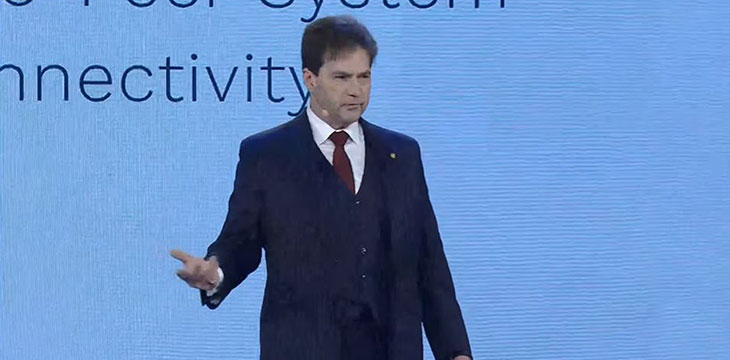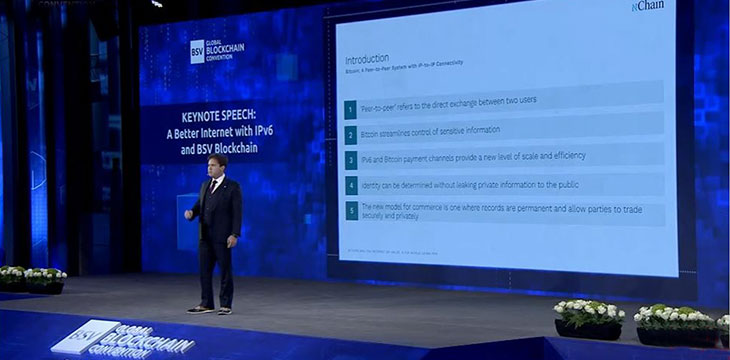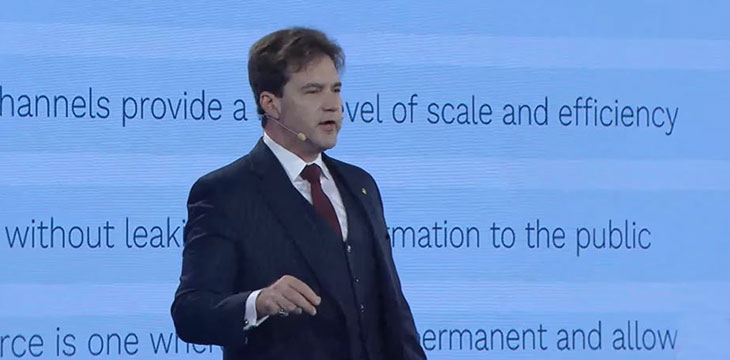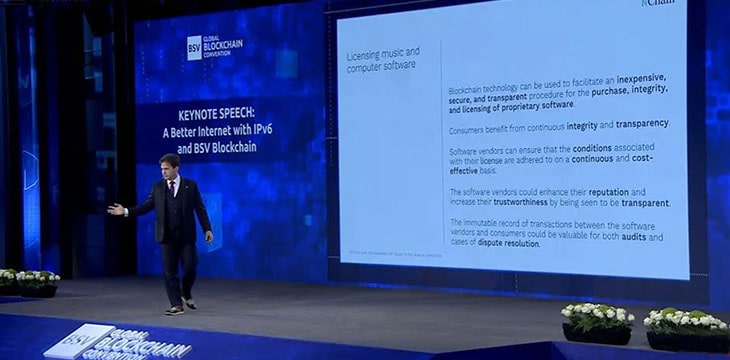|
Getting your Trinity Audio player ready...
|
The newest version of the Internet Protocol is like the original Bitcoin, in that it’s all about scaling and delivering on the promise of truly peer-to-peer (P2P) transactions.
Day 2 of the BSV Global Blockchain Convention in Dubai saw Dr. Craig Wright take the stage for a keynote address titled A Better Internet with IPv6 and BSV Blockchain. Wright explained how the new IPv6 protocol will work with Bitcoin SV (BSV) to enable machines to talk to other machines so that people can talk to other people. If that sounds contradictory, buckle up.
Wright began by breaking Bitcoin down to its basic building blocks. “It’s a ledger. It records things. It should scale. It should be cheap.” The rich have never lacked access to banking options; what’s needed are cost-effective solutions to help “people who aren’t included in the global economy.” Achieving this will require cheap methods of allowing machines to talk to machines through “interoperable systems, not a series of walled gardens owned by large corporations.”

IPv6 is intended to dramatically boost the number of unique IP addresses, the upper limits of which were breached under the older IPv4 standard. Without IPv6, further growth in areas such as Internet of Things (IoT) devices—the total number of which is already pushing 10 billion worldwide—would be impossible. In short, IPv6 scales whereas IPv4 doesn’t.
Wright notes that Bitcoin, as detailed in his 2008 white paper, “always scaled.” While the bastardized BTC blockchain is capped at a maximum of seven transactions per second, BSV can handle hundreds of thousands of transactions a second. BSV also boasts a theoretical limit of 2129 transactions per block, a level that Wright says even his “great-great-great-grandchildren’s great-great-great-grandchildren” won’t live to see exhausted.
In other words, BSV and IPv6 go together like chocolate and peanut butter. Hungry yet? Grab a spoon and let’s dig in…
Cutting out those pesky middlemen
Wright says Bitcoin’s key aspect was “IP to IP.” Alice goes to Bob, conducts a negotiation, exchanges a transaction. Two peers coming to an agreement and not worrying about whether some Silicon Valley giant says it’s okay.
Sensitive information can be directly exchanged with a high degree of security but adding digital middlemen—email servers, FTP servers, web servers, cloud storage—creates vulnerabilities in our networks. “IPv6 enables direct connectivity. It means rather than having a large data center sitting in the U.S. controlling everything, we can start going back to the original model of the internet. Peer distribution. It means people.”
It also means identity. Not shared to the world so everyone can see but having pseudonyms that link to IP addresses and prove our identity. With the expanded number of addresses available under IPv6, “each of us has a pseudonym that’s traceable … privacy now works because we have so much information that no one can track it.”
“I can negotiate IP addresses based on my keys. I could have a master key that now links and creates sub-keys. My IP addresses are linked to my identity but equally you have no idea what they are. Someone that I’m communicating with, someone who exchanges information with me, does. That means I can have a key and exchange it with you and the two of us now know each other’s IP addresses. No one else in the room can ever figure them out. That’s called privacy.”

Wright added the caveat that law enforcement agencies can still “target people” suspected of wrongdoing on the blockchain. “If you are a criminal, they can follow back the hard way, which is ‘that guy, they get a deal with, and he gives them that guy, and they prove along the chain.’ And that’s how it should be. It shouldn’t be the NSA or GCHQ watching everything we do.”
Another fine mesh
Wright says it’s no wonder that BTC, Ethereum and other blockchains fail utterly when it comes to P2P. “They have a mesh-like server network. It’s a horrible design. What you end up doing is, I send a transaction to the network, and then I have to search the network to find my transaction. The larger the system gets, the slower it gets, the harder it is. Doesn’t sound too efficient.”
Enter simplified payment verification (SPV), which Wright says “should be a critical aspect of how any blockchain works … If I hand someone else a transaction, directly, I don’t need to go searching for it. They don’t need to go searching for it … That’s why peer-to-peer scales.”
The simple act of registering that transaction on the network offers proof that the value hasn’t been double-spent. “I have a key-value database that is indexed by cryptographic hashes … So I can look up very quickly a table of ‘has this been seen before’? Instant. Fast. I now have an SPV Merkle proof and go ‘validate.’ Not because the miners say it’s okay but because I checked it. And not because I checked every transaction on earth. I don’t care what the rest of you do. P2P means my communication. I care about mine. If you’re paying me, then yes, I want to check that it’s valid. But if you’re paying someone on the other side of the room, I couldn’t care less.”
Let the negotiations commence
BSV’s capacity for facilitating micropayments for fractions of a cent means individuals can exchange information—“keys, IP addresses, domain names, emails, WhatsApp addresses, anything”—while having the option of imposing a micro-paywall for others to access. Access could also be granted via tokens that identify members of a specific group. “This is what decentralization is about. It’s not DAOs, not unauthenticated groups or partnerships. It’s people choosing how they will negotiate, setting the rules of negotiation.”

Wright envisions these negotiations applying to content creators, whose rights “should follow through with the items you create.” Referencing an NFT patent he filed in 2016, he noted how at the time he’d talked about “boring things” like the rights of artists to control “how their intellectual property is on-sold.” For instance, Wright believes musicians should have the right to set the parameters for how concert tickets are resold, which could help undermine the parasitic scalper model that has pushed ticket prices into the stratosphere.
Wright also believes “signing software” would allow visual artists to control their digital artwork (not the “boring apes” variety, the “good digital art” out there). “NFTs, the way they’re implemented in digital art, suck. What should happen is not only the rights but the access to the artwork should be controlled. You should be able to own that piece of artwork and restrict and limit access to yourself or anyone you share it with. If you want to give a copy for a week, that should happen. It should make things like a physical item. That’s what I envision. Control to the owner, the user, the creator.”
In the end, Wright says “contracts are promises between people. This is a key that people think doesn’t seem to matter. Machines can’t contract. People do. We can have machines agree [on] what people want after people set conditions.”

 02-23-2026
02-23-2026 




